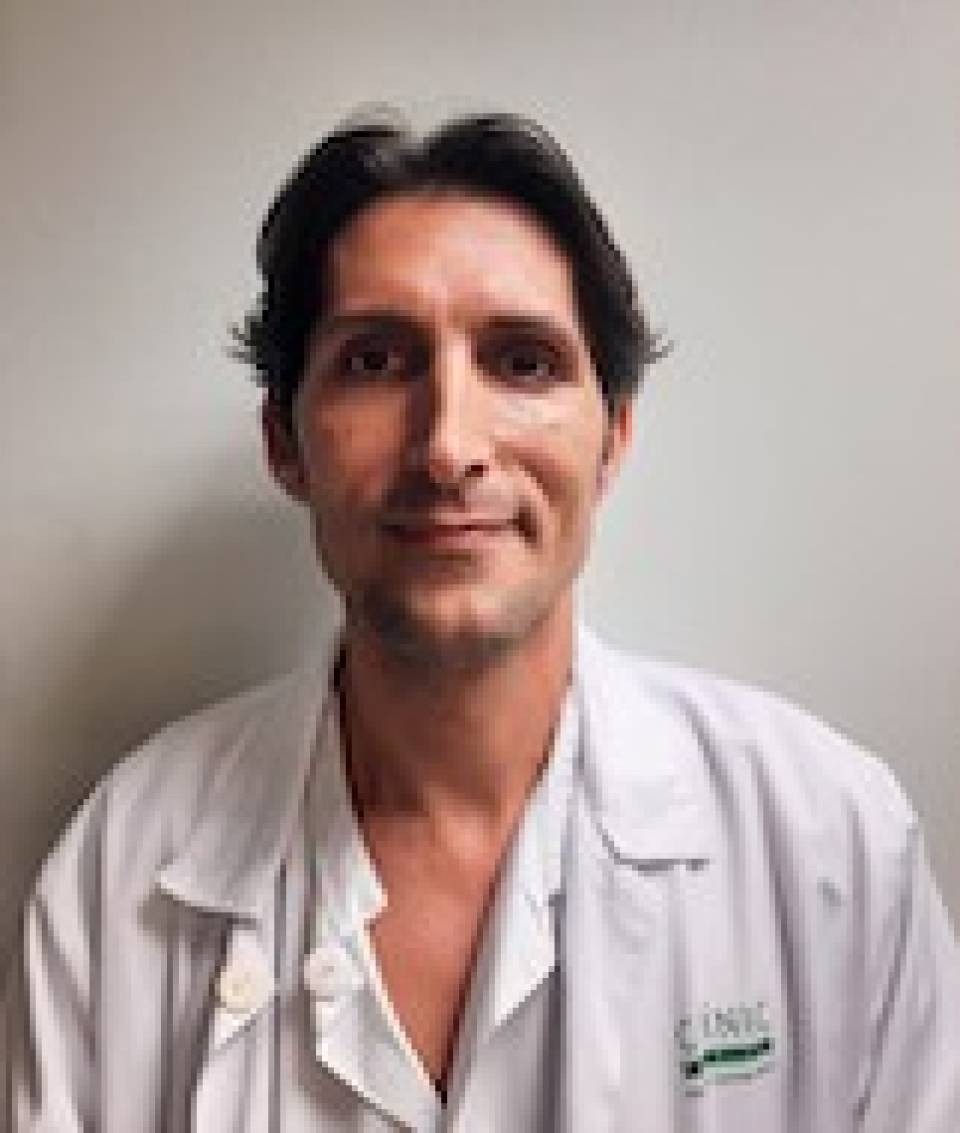Living with HIV
Nowadays, a person diagnosed with HIV has a good prognosis in the majority of cases. New treatments have meant that people living with HIV can have a quality of life and life expectancy similar to that of people without HIV, provided that they follow their treatment and undergo the necessary medical controls. Despite this good prognosis, it is important to remember that all patients must receive antiretroviral therapy and receiving it earlier will reduce the risks of developing problems related to the disease.
If I have an undetectable HIV viral load, can I transmit the infection?
Complications of HIV
Patients in advanced stages can start to notice symptoms associated with AIDS or with the complications that appear when the body’s defences decline. The symptoms of AIDS can include extreme weight loss, diarrhoea and dementia. Certain types of cancer and opportunistic infections can appear in this stage.
Kaposi’s sarcoma
Kaposi’s sarcoma is a type of vascular and lymphatic tumour that was first described in 1872. Until the outbreak of AIDS, this cancerous process was rare; however, from 1980 onwards, epidemic Kaposi’s sarcoma became the most frequent neoplasia among patients with HIV. This tumour is the element that defines the diagnosis in almost 10% of AIDS cases. It is observed almost exclusively in men who have sex with men. Before combination antiretroviral therapy became available, it was said that up to 30% of these patients developed the tumour at some time during their illness. Epidemiological studies carried out to date have confirmed the close relationship between human herpesvirus-8 infection and the risk of developing Kaposi’s sarcoma. In most patients, Kaposi’s sarcoma manifests with characteristic skin lesions that appear as different sized stains, blotches or lumps (ranging from millimetres to several centimetres), which are spindle-shaped and have a tendency to confluence.
Other tumours
Patients with AIDS can also develop other types of cancer, such as non-Hodgkin lymphoma (NHL), Hodgkin’s disease and anogenital neoplasia; all associated with human papillomavirus infection. Burkitt’s, immunoblastic, non-Hodgkin and primary brain lymphomas, as well as invasive cervical carcinoma, all have a higher rate of incidence in patients with HIV. These tumours are treated in a similar manner as they are in patients without HIV and their prognosis can improve with antiretroviral therapy.
Opportunistic infections
When the immune system is severely weakened (generally when the CD4 lymphocyte count is below 200 cells/mm3), then the patient can be affected by a series of infections with different degrees of severity. These infections never appear in people whose defences are functioning correctly, with the exception of pulmonary tuberculosis. Being infected may require spending some time in the hospital and its treatment should continue until the immune system recovers with the help of antiretroviral therapy. The frequency of these opportunistic infections has decreased dramatically in recent years and they are almost exclusively observed in patients who had not previously been diagnosed with HIV and therefore had not received antiretroviral therapy.
There is a long list of opportunistic infections and it includes: esophageal candidiasis, infections spread by fungi such as Coccidioides, Histoplasma or Cryptococcus, diarrhoea caused by Cryptosporidium or Isospora, Cytomegalovirus retinitis, long-evolution herpes simplex virus infection, generalised herpes zoster virus infection (chickenpox in a patient who already had it during childhood), pulmonary or disseminated tuberculosis, infections caused by nontuberculous mycobacteria, Pneumocystis and cerebral toxoplasmosis, among others.
Overall advice

The use of condoms will help protect the person from other sexually transmitted infections and also protect others from being infected with HIV.

Talking with other people infected with HIV can prove helpful when adapting to and accepting the disease with normality.

Taking the medication every day as prescribed. Alarms on mobile phones or watches, or in agendas, will help patients to remember when to take the medication and the time/date of follow-up visits.

If patients are experiencing difficulties taking the medication, sharing it with the healthcare team will help to look for better alternatives (change schedules or how the medication is taken, change the treatment, etc.).

Giving up smoking will have a very beneficial effect on person’s general health.

A balanced diet, with plenty of fruit and vegetables and low in fats, will help to keep healthy.

Regularly practising physical exercise will help to improve health and quality of life.

Getting enough sleep and rest will provide patients with enough energy to complete your daily activities.
Things to keep in mind

If patients have any diseases. The presence of another disease at the same time as HIV could affect the progress of both illnesses, the selection of their treatments and the time to start each treatment.

If there are difficulties in taking the medication. The doctor could prescribe patients very simple treatment guidelines or give them advice that will help them follow the treatment correctly

If the patient is taking herbal products, other substances or any other medications. Therapies used to treat HIV can interact with other medicines or products, which could cause an increase in the secondary effects or a decrease in the effectiveness of the HIV drugs or the other substances.

If patients drink alcohol or take recreational drugs. Alcohol and the consumption of substances could affect their capacity to follow the HIV treatment correctly, as well as interacting with the HIV medication.

If there is a wish to have children. With correct pregnancy planning, it is possible to have healthy babies.

If emotional support is needed. Various non-governmental organisations (NGOs) can provide patients with psychological support and social care free of charge. They can also access these services through the national health system or public social services.
Emotional health
Discovering having HIV can trigger a wide range of feelings. After the diagnosis, many people feel afraid, worried about the impact on their health, guilty, embarrassed, angry, sad or anxious about what others may think. It is important to remember that it is normal to have feelings that may seem inappropriate. Recognising one’s own feelings is the first step to dealing with them.
In the majority of cases, patients’ feelings change over time after they are given the diagnosis. In general, people progressively come to accept that they have HIV, although certain aspects related to the disease continue to cause them anxiety or discomfort. There are many things that can help to obtain emotional and psychological well-being. For example, many people find talking about their feelings with their family or friends is a great comfort.
If, even so, negative thoughts persist and are an emotional burden, professional support or support associations for people with HIV can be very helpful. These associations organise meetings between people in the same situation so that they can share experiences and concerns and feel more supported. Some of these therapies take place in the hospitals themselves, which makes it much more convenient.
Sexual health
Sexuality forms part of our well-being. Many people often feel differently about themselves when they discover they have HIV. The experience can be so traumatic that it causes them to abandon their sexual activity, at least temporarily, and it affects other aspects of their lives.

Some people may feel less attractive, both physically and sexually, which affects their self-confidence when it comes to establishing emotional and/or sexual relationships. Others develop negative feelings towards sex and even towards their own sexual identity.

Patients may also experience anxiety about the need to explain their HIV infection to past, present or future sexual partners.

Patients must not hesitate to express their concerns to the healthcare professionals. The HIV specialist doctor, along with the nursing team, will answer all the questions and, if necessary, they can refer patients to specialised resources.

Patients often worry about the possibility of transmitting HIV to their partner, which can lead to a decrease in sexual desire. In this regard, it is worth remembering that condoms (both male and female varieties) are still a very good method of preventing HIV transmission. If used correctly and consistently, they prevent the transmission of other sexual infections and avoid unwanted pregnancies.

Furthermore, it helps to bear in mind that when a person with HIV is receiving antiretroviral therapy and their viral load is undetectable, then the chance of transmitting HIV to their sexual partner or partners is nearly zero.
Reproductive health
Being diagnosed with HIV does not contraindicate having a baby. The increase in life expectancy obtained through the use of antiretroviral therapies has also been accompanied by a change in the life desires of HIV patients. There are increasingly more women with HIV and more serodiscordant couples (a couple were one person has HIV and the other does not) who consider reproduction as a genuine option. Until recently, serodiscordant couples wishing to have a baby opted for assisted reproduction techniques, particularly methods involving sperm washing, to prevent HIV transmission from the male to the female and to the future baby, or less effective techniques such as self-insemination in the case of couples where it is the woman who has HIV.
Quality of life
People living with HIV can continue to work, have sex, take part in sports, travel, go out with friends and even have children, if that is what they wish.
After diagnosis, it is normal that some people develop negative thoughts and feelings, and that they may feel unable to control certain situations they experience. These can impact on the perception of one’s own general happiness and well-being.
Several people with HIV find comfort by introducing lifestyle changes after the diagnosis. This also helps them to notice an improvement in their health and quality of life.It is not about changing life radically, but rather about introducing small changes, such as a healthier diet or taking part in regular exercise. If there is the wish to cut down on smoking, or give up completely, but do not feel capable, the patient’s healthcare team can give them advice and tell them where to find resources which can help.
To find balance in the new stage of life, it may be useful to modify habits or include new ones. It is a process in which doubts may appear but keeping in mind that the team is there to help and to trustingly listen patients’ concerns.
Rights of patients
It is important to remember that people with HIV have the same rights as any other citizens. However, the tremendous scientific advances have not been accompanied by similar developments in terms of standardisation of the disease. This is due to the stigma which is still associated with the disease.
Even though there have recently been some encouraging changes in how society perceives people with HIV, the data available in Spain indicate that many discriminatory practices may well persist in several areas of daily life. This should not make patients feel bad about themselves. Nor should it make them avoid situations or constantly worry about the possibility of being discriminated against. On the contrary, knowing this can help to become aware of the fact that, like all other citizens, patients have rights that are protected by the judicial system through the application of different laws. Familiarity with rights and acquiring certain skills can help to deal with any stigma or discriminatory situations.
HIV patient support associations can inform about rights and help acquire or develop these skills.
In the healthcare sector, there is the right to receive information about treatment process and state of health. In accordance with the principle of patient autonomy, there is the right to receive prior instruction before giving informed consent for any diagnostic or therapeutic procedure that a patient will undergo. Similarly, the right to participate in decision-making along with the doctor is recognised.
It is important to know that the information about one’s own health is confidential. Only patients and the healthcare team caring for them are allowed to access your personal data. There is also the right to access the medical history or request written information about the healthcare process and the state of health.
If there is the belief that a patient has been discriminated against in the hospital or in any other healthcare centre because of HIV, then there are different options available: complain to the patient services department at the hospital, inform the patient ombudsman in the autonomous community or take legal action. It is important to remember that nobody should be discriminated against because of their ethnic origin, gender, sexual orientation, disability or any other personal or social circumstance.
Substantiated information by:



Published: 20 February 2018
Updated: 5 December 2022
Subscribe
Receive the latest updates related to this content.
Thank you for subscribing!
If this is the first time you subscribe you will receive a confirmation email, check your inbox


